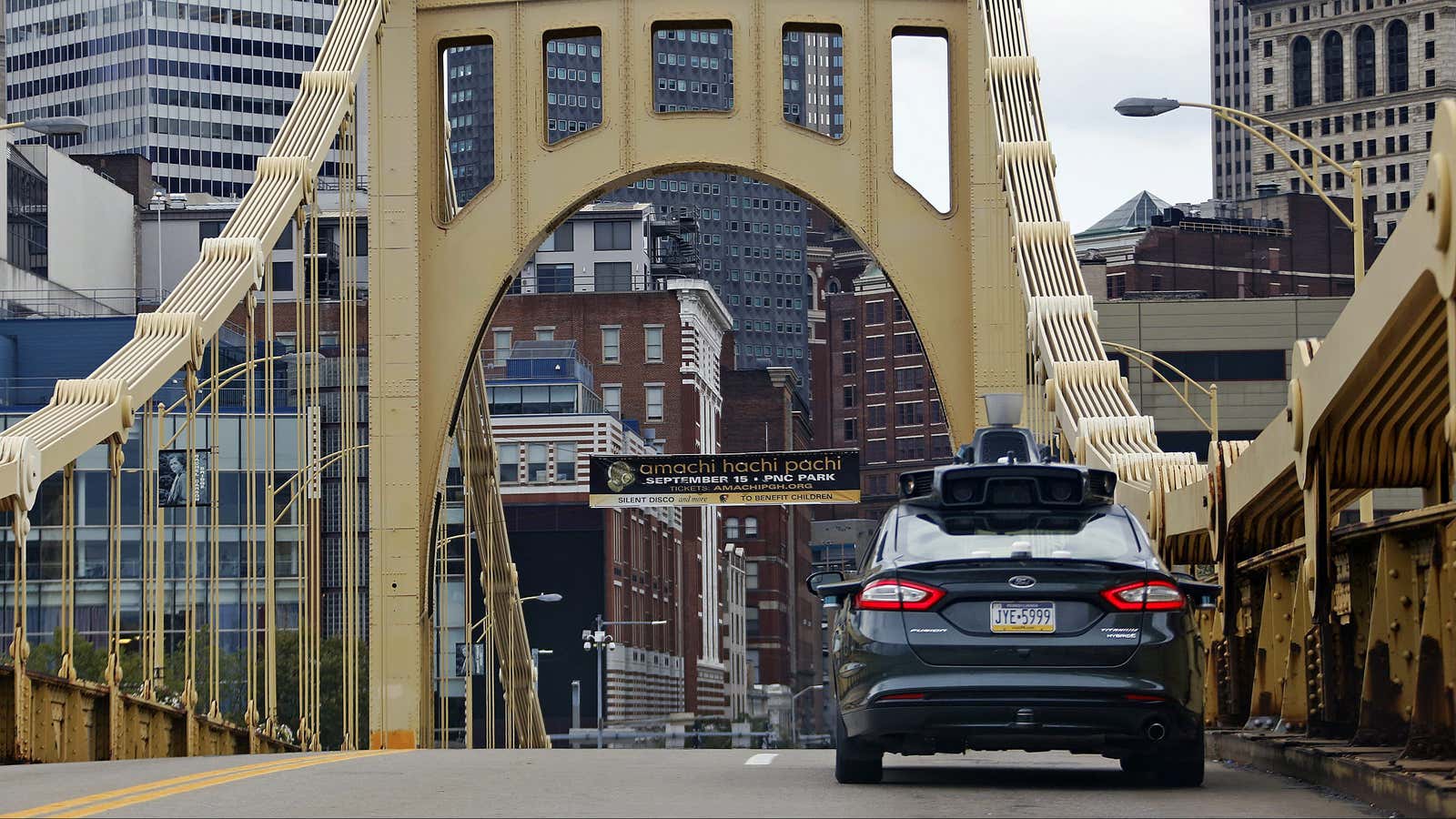When Uber put its self-driving cars on the road in Pittsburgh in September, the launch was presented very much as a partnership between the company and the city. Uber had set up a driverless technologies research center in Pittsburgh 18 months earlier and staffed it with talent from Carnegie Mellon University. Pittsburgh, a former industrial city, was eager to refashion itself as the East Coast’s Silicon Valley. “We have created a startup government that recognizes when it comes to innovation, regulation never comes first,” Pittsburgh mayor Bill Peduto said in September.
In practice, the relationship was more strained. Emails obtained through a Right-to-Know request by PennLive, a local news outlet, show Uber asked a lot of Pittsburgh to operate its self-driving cars, and offered relatively little in return.
Pittsburgh hoped accommodating Uber would help it win the 2016 Smart City Challenge, a US Department of Transportation competition to “fully integrate innovative technologies” into local transportation networks with a $50 million prize. Peduto proposed Uber invest $25 million into building a new transit connection from Carnegie Mellon to the Hazelwood neighborhood where the company was planning a test track for its self-driving cars. In return, Peduto wrote on May 21, Uber would get “exclusive rights to operate along the busways for five years.”
Uber had other ideas. “The monetary investment required” and the “need for USDOT approval make this difficult for us,” Ashwini Chhabra, Uber’s head of policy development, wrote in an email on May 23, the day before the final Smart City application was due. “That said, there may be other ways for Pittsburgh to support self-driving mobility in a way that should be appealing to USDOT. Uber is testing self-driving cars in Pittsburgh already, but that service could be enhanced tremendously … if the city were to make a handful of modifications to the streetscape to better accommodate the nascent technology.”
Chhabra suggested Pittsburgh designate “a dozen or so priority routes for on-demand self-driving service that link high-demand areas of the city.” He also provided a list of “smart infrastructure upgrades” the city could make, according to documents obtained by PennLive:
Non-exclusive access to certain bus lanes (not busways)—this would not be exclusive to the company, but rather would be for any providers of on-demand self-driving service.
Designation/painting of dedicated lanes in particularly difficult areas and intersections for use by on-demand, self-driving cars.
Designation/painting of dedicated pickup-dropoff areas around select spots for on-demand, self-driving cars.
Improved signaling/signage at certain intersections to optimize movement of self-driving cars.
Installation of DSRC signals that can be utilized by self-driving cars—I believe this is already part of the city’s Smart Cities application.
Installation of bike lanes on select streets, which, in addition to promoting bike use, would create an easier/safe environment for self-driving cars.
Non-exclusive access to municipal parking lots to allow staging of self-driving cars while they are awaiting dispatch—understood that there would be some cost associated with this which participating providers would be expected to bear.
Prioritization of snow removal so as to permit continued service on these routes.
Peduto sent back a curt reply that same day:
I don’t believe this would hold up in court. Non-autonomous vehicles would definitely sue. Also, people would rebel that priority is being given to a private company for use of public assets. Giving private companies over services like snow plowing would guarantee I would be voted out of office. You aren’t offering anything back to the public.
I guess we won’t be able to offer a proposal. I hope Austin and Google won’t beat us because of this.
B.
Pittsburgh didn’t win the Smart City Challenge but neither did Austin; the prize went to Columbus, Ohio, in June. The city did not reach any agreements with Uber on infrastructure upgrades or routes, a spokesman for the mayor’s office told Quartz.
Uber, meanwhile, continued with its driverless efforts in Pittsburgh, and even pushed up its self-driving rollout to September from November. The company planned to have more than 100 autonomous cars traversing public roads in Pittsburgh by the end of this year.
